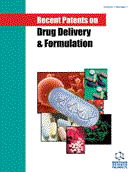Abstract
Aims and Background: The fundamental objective of current study was to encapsulate Aripiprazole (ARP) within Pluronic F127 micelles to improve its aqueous solubility. The recent patents on Aripiprazole (JP2013136621) and micelles (WO2016004369A1) facilitated selection of drug and polymer.
Materials and Methods: The drug-laden micelles were fabricated using thin-film hydration technique. Optimization of the micellar formulation was done by using response surface method (RSM). The Pluronic F127 concentration of 150 mg and 75 rpm rotational speed of rotary evaporator were found to be optimized conditions for formulating micelles.
Results: The prepared batches were further characterized for PDI (polydispersity index), zeta potential, % DLC (% Drug loading content), % EE (% Entrapment Efficiency) and % drug release study; results of these parameters were found to be 0.228, −4.04 mV and 76.50 % and 18.56 % respectively. It was observed from the In vitro release study that 97.37 ± 1.81 % drug had released from micelles after 20h which were found about thrice as compared to that of pure drug. The optimized ARP micellar formulation was characterized using DSC (Differential Scanning Colorimetry), FT-IR (Fourier Transformed Infrared Spectroscopy), P-XRD (Powdered X-ray Diffraction Study) and TEM (Transmission Electronic Microscopy) studies. ARP-loaded micelles displayed a hydrodynamic diameter of 170.3 nm and a sphere-shaped morphology as determined by dynamic light scattering as well as TEM study.
Conclusion: It is concluded that the prepared polymeric micellar system has an excellent potential to be used as a delivery carrier for Aripiprazole with increased solubility.
Keywords: Aripiprazole, amphiphilic copolymers, pluronic F127, polymeric micelles, response surface method, solubility.
Graphical Abstract
 32
32 4
4 1
1














